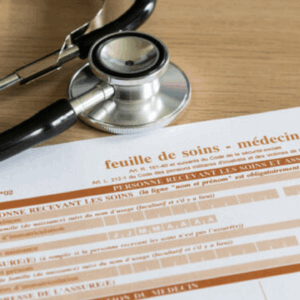French Healthcare 101: Understanding Your Rights as an Immigrant

This post is part of my Healthcare in France for Expats series. If you found it helpful, check out my other articles and more to make navigating the system a little easier. Check back often—I’m adding new guides regularly to make French healthcare a little less confusing!
As an immigrant living in France, you do have certain rights to access the public healthcare system, called Assurance Maladie or Sécurité Sociale, but your eligibility and coverage depend on your residency and work situation. France is often praised for having one of the most comprehensive healthcare systems in the world, and the good news is that foreigners who legally live here can benefit from it too.
That said, navigating the system as a newcomer can feel overwhelming. Between acronyms like PUMa (Protection Universelle Maladie), paperwork requirements, and the infamous French bureaucracy, figuring out when and how you’re covered isn’t always straightforward. Whether you’ve moved to France for work, studies, family reasons, or simply a change of pace, understanding your rights to healthcare is one of the first essential steps to feeling settled and secure.
In this post, we’ll walk through the basics of who is eligible, what documents you need, and how to register so you can start using the French healthcare system with confidence.
General Right to Healthcare (PUMA – Protection Universelle Maladie)
In 2016, France introduced PUMA (Protection Universelle Maladie), a healthcare reform designed to simplify and broaden access to the national healthcare system. Before this change, your right to healthcare in France was often tied to your employment status, your spouse, or other administrative criteria, which left some residents in limbo. PUMa shifted the focus to residency rather than professional activity, meaning that almost everyone who is legally living in France can now benefit from healthcare coverage.
Here’s what that means for you:
If you are legally residing in France for more than 3 months (for example, as a retiree, a dependent family member, or someone between jobs), you have the right to apply for public health coverage. You don’t need to be working to qualify — residency itself is enough.
If you are working or self-employed in France, you’re automatically eligible from day one. In this case, your employer or URSSAF (for freelancers) registers you with the system, and your healthcare contributions are deducted directly from your salary or social charges.
This shift to a residency-based model makes the French healthcare system one of the most accessible in Europe for expats/immigrants. It means that as long as you’re here legally and establish your life in France, you won’t be left without medical coverage. The main step is making sure you apply correctly through your local CPAM (Caisse Primaire d’Assurance Maladie) and submit the required documents so that you can get your Carte Vitale (health insurance card).
How It Works
Once you’re eligible for the French healthcare system, the next step is to apply for your Carte Vitale, that small green card that proves you’re covered by Assurance Maladie. You’ll do this through your local CPAM (Caisse Primaire d’Assurance Maladie) office, which manages health insurance in your area. Having a Carte Vitale makes the entire process of seeing doctors, filling prescriptions, and being reimbursed much smoother, since it links your healthcare expenses directly to the system. (If you’re unsure how to get started, I’ve broken down the full process in detail in my post How to Apply for French Sécurité Sociale as a Foreigner).
Here’s what to expect:
Reimbursement system: In France, you usually pay for healthcare services upfront, but then the system reimburses you a certain portion directly into your bank account. For example, a standard doctor’s visit might cost €25, and about 70% of that fee is reimbursed automatically by Assurance Maladie. For hospital stays, the reimbursement rate is typically around 80%. Certain types of care — such as maternity, chronic illnesses, or major medical treatments — are reimbursed at much higher rates, often up to 100%.
Mutuelle (top-up insurance): To cover what Assurance Maladie doesn’t reimburse, most people take out a mutuelle, which is a complementary health insurance policy. The mutuelle pays the difference between what the state reimburses and the full cost of care. For example, if your doctor visit leaves you with €7 or €8 out-of-pocket after state reimbursement, your mutuelle will usually cover that. Some employers provide a mutuelle as part of your work contract, while others you’ll need to arrange yourself.
Using your Carte Vitale: When you go to the doctor, pharmacy, or hospital, you’ll hand over your carte vitale. This allows your reimbursement to be processed electronically and usually means you don’t need to send in paperwork or receipts. If you don’t yet have your card, you can still get reimbursed, but you’ll need to mail in feuille de soins (paper forms) along with your receipts, which can take longer.
Requirements to Access
As is par for the course in France, registering for healthcare involves gathering a carefully curated stack of personal paperwork. While the exact documents can vary slightly depending on your personal situation (student, worker, retiree, family member, etc.), these are the general requirements:
Proof of legal residence: If you’re a non-EU citizen, this means a valid visa or titre de séjour (residency permit). EU/EEA/Swiss citizens don’t need a visa but should provide proof of their right to reside in France, such as a passport or national ID card. To see if your visa type is valid, there’s a chart here that breaks it down.
Proof of residence in France for at least 3 months (if you’re not working): This requirement ensures that PUMA coverage is tied to a stable residency rather than short-term stays. Acceptable documents include rental contracts, recent utility bills, home insurance contracts, or an attestation d’hébergement if you are living with someone.
Identification documents and civil status records: A valid passport or EU ID is always needed, along with your birth certificate. Non-French documents often need to be officially translated into French by a traducteur assermenté (certified translator). If you are married or have dependents, you’ll also need marriage or birth certificates for your spouse and children.
Proof of address: In addition to residency, CPAM will typically ask for a recent document (within the last 3 months) that confirms where you live, such as an electricity, gas, or phone bill in your name. If you’re living with someone, a signed letter from your host plus their utility bill is acceptable.
Bank details (RIB): A French bank account is essential since reimbursements are made via direct deposit.
If you’re working: The process is much simpler. Your employer is legally required to register you with the French social security system when you start your job. It is a good idea to follow up on your end to ensure the proper paperwork is provided. The same applies if you’re self-employed — you’ll register through URSSAF and be automatically affiliated with healthcare coverage.
The main challenge for foreigners is often not the eligibility, but having the correct paperwork that meets the French administrative standards (especially with translations and official copies). Once you’ve submitted a complete application, CPAM will review it and, after approval, you’ll be able to create your online account through Ameli.fr and be able to request your attestation de droits (paper certificate of coverage).
Special Cases
Depending on your nationality and legal status here in France, the path to accessing healthcare may look slightly different. Here’s a few examples of some different situations:
EU/EEA/Swiss citizens – If you’re from another EU country, the EEA, or Switzerland, you can use your European Health Insurance Card (EHIC) during your initial stay in France. This card grants you access to the necessary healthcare under the same conditions and costs as French residents, with costs reimbursed through your home country’s system. However, if you plan to settle in France long-term (more than 3 months), you’ll need to switch to the French system by registering with CPAM. This ensures your care is managed in France, rather than through cross-border agreements.
Non-EU foreigners – For citizens outside of the EU/EEA/Switzerland, access to healthcare is tied to your legal right of residence. That means you’ll need to hold a visa de long séjour (long-stay visa) or a titre de séjour (residency permit). Once you’ve established at least 3 months of residence (unless you’re working, in which case you’re covered right away), you can apply for coverage through CPAM. This process usually requires more paperwork, including certified translations of civil status documents.
Students – Up until 2019, students in France had to register under a separate student health insurance system. Today, students, whether French or foreign, are included under PUMA and follow the same process as any other resident. Some universities may still guide students through a simplified enrollment process, particularly for non-EU students arriving for the first time. In either case, you’ll need to register through CPAM and then consider taking out a complementary mutuelle étudiante (student top-up insurance) if your school offers one.
Family members – Spouses, civil partners (PACS), and dependent children can usually be added to an existing insured person’s file, rather than applying independently. This is known as being a ayant-droit (beneficiary). In practice, it means your healthcare rights are linked to your partner’s or parent’s coverage. It is recommended that adults create their own health insurance file, but being listed as a dependent can simplify things when you first arrive as part of a family move. If you are the spouse of a French national, you are allow to apply as soon as your visa is validated and do not need to wait the 3 month.
Rights Once Enrolled
Once you’re officially enrolled in the French healthcare system, your rights are essentially the same as those of French citizens. That means you can access the full range of medical services without discrimination based on your nationality or residency status. Here’s what that includes:
Comprehensive medical services: You’ll have access to médecins généralistes (general practitioners), specialists, hospitals, pharmacies, maternity care, preventive screenings, vaccinations, and mental health services. Whether you need a routine check-up, long-term treatment, or emergency care, you’ll be treated under the same system and at the same rates as French nationals.
Choosing a médecin traitant (primary care doctor): One of your first steps after joining the system should be to declare a médecin traitant (primary care doctor). This will be your go-to doctor who coordinates your medical care and referrals to specialists. While you are free to see other doctors, choosing a médecin traitant is important because it ensures you receive the highest level of reimbursement (typically 70% of the consultation fee). Without one, your reimbursements drop significantly.
Enhanced coverage for certain situations: While most healthcare in France is reimbursed at the standard rates (70–80%), some categories of care are covered up to 100% by Assurance Maladie. These include:
Maternity care: From the fourth month of pregnancy until 12 days after birth, almost all pregnancy-related care is fully covered.
Chronic illnesses (affections de longue durée or ALD): Conditions such as diabetes, cancer, or multiple sclerosis are eligible for full reimbursement of related treatment and medications.
Workplace accidents or occupational illnesses: If your health issue is linked to your work, the system covers all costs without out-of-pocket expenses.
Navigating the French healthcare system as a foreigner can feel intimidating at first, but once you understand the basics from eligibility, to how reimbursements work, and the importance of the carte vitale and a médecin traitant, it becomes much more straightforward. The key takeaway is that as a legal resident, you’re entitled to the same high-quality care as French citizens, often at little to no cost out-of-pocket once you add a mutuelle. While the paperwork may test your patience (this is France, after all), the effort is well worth it for the peace of mind that comes with knowing you and your family are covered.


You May Also Like

Essential kitchen utensils I cannot live without
4 April 2021
Feuille de Soins in France: What It Is and How to Use It
12 September 2025